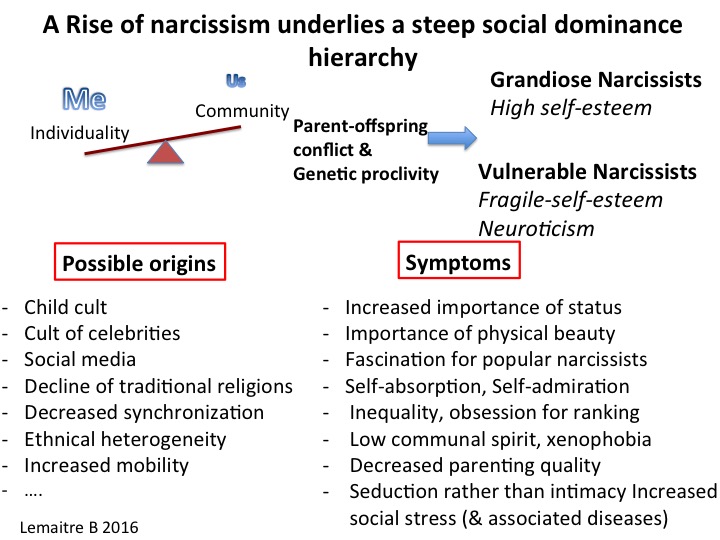A connection between the obesity and the narcissistic epidemics
While obesity is associated with low exercising and excessive food intake, these causes are not sufficient to explain why some persons are more affected than others or why obesity is more prevalent among individuals at the bottom of the social hierarchy. The reason beyond the impressive increase in obesity prevalence in the last 30 years is also the topic of debates among scientists. In a recent article, I discuss a model linking the recent increase of obesity to the rise of narcissism. In short, societal changes have led to a rise of narcissism, notably in the US, leading to a society perceived as more unequal, materialistic, hedonistic and competitive. I speculate that this rise in societal narcissism underlies a steep social dominance hierarchy1 (Figure 1), and is associated with an increased social stress2. Successful individuals tend to eliminate this stress by exercising (running, body building, sport…)3, while other individuals, notably when placed at lower rank positions, tend to be less motile and to over-eat4. Importantly, individuals (and possibly ethnic groups) differ in their sensibility to social dominance stress due to their personality, which could explain why individuals or ethnic groups are differently affected. I speculate that individuals higher in the vulnerable form of narcissism (fragile self-esteem with up-and-downs & neuroticism) are at higher risk of overeating. In this article, I also discuss whether over-eating and increased body weight is just a collateral consequence of stress (consistent with the “comfort food” hypothesis) or whether it could have a regulatory function, allowing individuals to re-adjust in the social hierarchy.
This model is supported by a number of correlations such as the concomitant increase in obesity and narcissism since 1980 or geographical correlations (the USA being more affected than Sweden or France)5. It can also explain the increased prevalence of obesity in certain minorities and the transmission of obesity from parents to child. More in the article.

Notes
- Elsewhere, I have speculated that the narcissism epidemic underlies a steeper dominance hierarchy. This is associated with a concomitant increase in rise for status and short-term mating opportunity, and a decrease in social cohesion and enduring bonding (see An Essay on science and narcissism).
- It is often assumed that social dominance hierarchies in primates are established through stress (ex. subordinate individuals are stressed by the dominant). We extrapolate that this is the same in humans except that humans compete to become more visible (‘popular’). Grandiose narcissists tend to sequester the attention on themselves, stressing the others.
- Exercising is generally assumed to be a way to evacuate stress from work or home. We could speculate that the satisfaction we draw from running is implicitly due to a positive validation of our social status. It could be comparable to looking at our reflection in a mirror and stating with relief: “yes I am still competitive”. The rise of narcissism would explain the recent rise in many “extremist” sportive activities (marathon…) for individuals who are in strong need of validation of their status.
- It has been well established that individuals at the bottom of the social hierarchy display an increased frequency of diseases (See works of Robert Sapolsky or Mickael Marmot’s book on “The status syndrome”). Our article goes further by suggesting that the social dominance hierarchy can become steeper over time (rise of narcissism) and by conceptualizing narcissism as a higher reactivity to social dominance hierarchy. The observation that women, who are often less narcissistic than men, are strongly affected by obesity contradicts our model at first sight. But women tend to score higher on neuroticism and this should make them more sensitive to social stress. Moreover, the emphasis on physical appearance (as a consequence of the rise of narcissism) could have a stronger impact on women since physical appearance is considered to be more important for them than for men.
- Both the US and the UK societies are characterized by high inequality and a cult of celebrities, which favors social status comparison. The weak protestant-based ‘social integument’ found in the US is good at promoting individual accomplishment but does not protect all minorities, resulting in decreased parenting quality (high prevalence of single parent family) and obesity. Other countries with a stronger emphasis on the group (being in the mean) are less affected by the obesity epidemic.